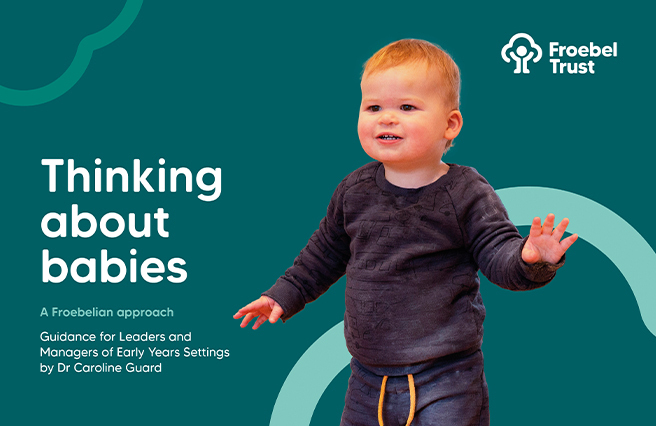'Hearing the voices of babies in baby-educator interactions
in Early Childhood Settings'
A study exploring how infants convey their voice/s in nursery provision across a sample of settings in England.

Download: Thinking about babies - guidance for leaders and managers of early years settings (April 2024)
This guidance, produced in April 2024, is based on the findings of Dr Caroline Guard's research. The guide considers how babies learn about themselves through their connections with others. It explores ways leaders and managers can create baby rooms in early years settings which reflect and acknowledge babies' needs.
Watch:
The ways a baby communicates are not always obvious and can be challenging for educators to identify and respond to in busy environments.
Project summary
The overall aim of this study was to explore how infants convey their voice/s in nursery provision across a small sample of settings in England. Considering the voices of children in research is not a new concept, accelerating in the last decade (Clark & Moss, 2012), yet there remains a void where ‘marginalised’ (Greve & Solheim, 2010) infants are ‘out of reach’ from researchers, who grapple with the ethical and methodological dilemmas of how to frame and interpret infant worlds with rigour and validity.

Download: Hearing Infant Voices - research summary report - published November 2023
Psychological and scientific approaches have dominated research, drawing from an array of theory to strengthen, analyse and evaluate findings and there are very few studies which have documented children’s real-life experiences naturalistically (Datler et al., 2010; Music, 2012). Even fewer have adopted a grounded theory approach to generate new theoretical concepts. This study challenged that perspective by embracing Froebelian principles of starting with the child by combining ethnographic case studies and grounded theory to explore an area in ECEC that has been relatively untouched.
This study assumed the position that there is a reality of infant knowledge and experience to be seen, concerned with, not what they can do, but how they experience alternative familiar environments. It placed infants at the very heart of scholarly understanding by listening to their communicative encounters, with practitioners through naturalistic observation in an ordinary context.
This project proposed to explore an array of perspectives through a multimodal interpretivist methodology which aimed to give expression to the social narratives of multiple children’s experiences through thick, rich descriptions (Geertz, 1973) of daily life, whilst reflecting on the multidimensional context of wider nursery provision using reflective dialogue and researcher field notes.
Research design
This study intended to add to international discourses of infant voices in research, acting as a platform to document the ordinary occurrences of infant day-to-day life in natural surroundings, whilst investigating aspects that may influence how and if their voices are heard and responded to.
The study was underpinned by the following research questions:
- What are the patterns of communication that infants employ to express their voice in nursery provision?
- How are these patterns of communication used to initiate and sustain interactions with practitioners in a nursery environment?
- How do the observed patterns of communication in nursery relate to parent’s descriptions of patterns of interactions in the home?
- In what ways do practitioners respond to infant voices in the setting?
- Do practitioners think the culture of the wider nursery environment influences their interactions with infants - and if so, in what way?
This is an important study as it proposes an original, naturalistic methodology aiming to bridge the gap between what can be seen and what is known about young children’s ordinary lives, investigating the reciprocal interactions between infants and practitioners across a cohort of case studies.
Read a summary of the project findings
Hearing Infant Voices - research summary report - published November 2023
Publications & presentations
- Paper published in 'Early Years International Research Journal' in March 2023.
"Arising from a larger ethnographic doctoral study (Guard n.d.), this paper aims to introduce a professional development tool, Video Interaction Dialogue which makes visible the voice initiations of babies to early childhood educators and offers scope to reconceptualise the way in which babies’ voices can be seen, heard, and acknowledged in early childhood settings."
- In February 2023, Caroline Guard presented her research at a webinar hosted by The Association for Infant Mental Health.
- In November 2023, Caroline Guard presented findings from her research at the OMEP Ireland 2023 Early Childhood Conference.
Final Thesis
Hearing the voices of babies in baby-educator interactions in Early Childhood Settings by Caroline Guard, BA, MA - University of Roehampton, 2023

